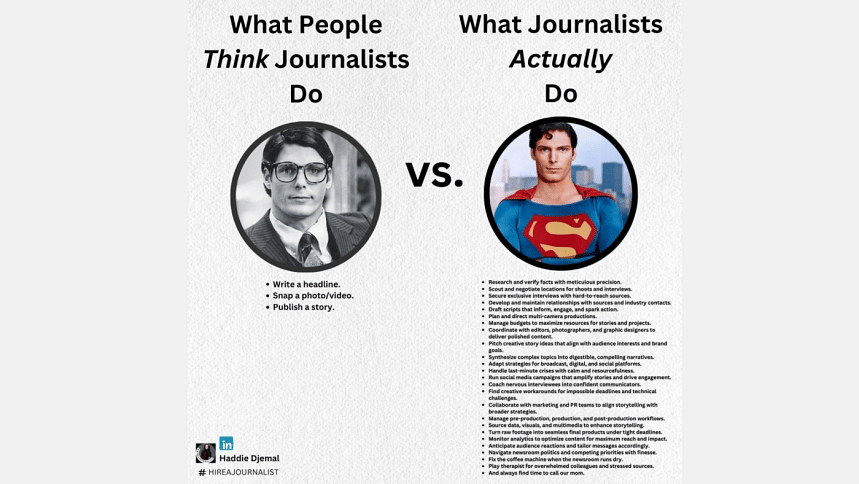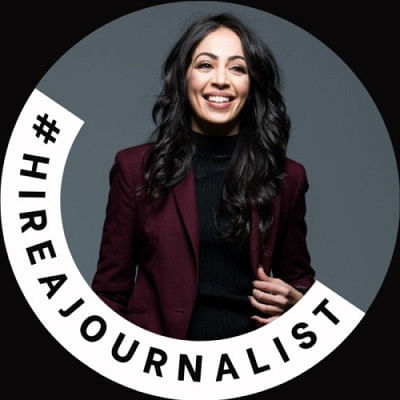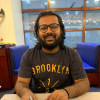#hireajournalist – A LinkedIn movement uplifting the heroes of the newsroom

Let's face it – you're more likely to consume news from social media than a reputed news outlet, simply because of how firmly social media is embedded in most people's daily lives. While the unreliability of news adrift on social media is dangerous for the consumer, the steady decline of traditional news media is also career-threatening for journalists. Democratising information, shrinking newsrooms and venerable publications have left many talented 'newspeople' without jobs, even with the extensive number of skills that journalists possess.
This is where Haddie Djemal stepped in, with the onset of her #hireajournalist movement on the professional networking platform LinkedIn. The movement was born from a moment of raw vulnerability and a clear understanding of the "superpowers," as she likes to call them, that journalists possess.
"So, there I am. I had just been laid off. I'm sitting at my desk, coffee in hand—probably my third cup at that point—just scrolling LinkedIn. Honestly, that had kind of become its own job for a while," says Haddie, who had previously worked for Dr. Phil's Merit Street Media in the USA. "I was deep in the news feed rabbit hole when I came across this post from a designer—I don't remember her exact role, but she had recreated the 'Open to Work' banner. Instead of green, it was this bright pink banner that just said: DESPERATE."

The word made her think. "There was this whole debate happening on LinkedIn about whether people should use the 'Open to Work' banner, whether it made you look hireable or made you look, you know, desperate. She just leaned into it. She was honest and vulnerable. She said, 'I've applied for everything I can, I still don't have a job, my bills are piling up, and I'm desperate.'"
It was at that moment that Haddie realised that journalists, even with a myriad of critical skills, had, to a certain extent, failed to publicise exactly that. "The designer had a specific skill set that only fit into one kind of lane. It was a niche. But with journalists? We don't just have valuable skills—we have critical skills. And they're not locked into one lane. They apply in every business, industry, and department," claims the University of Houston graduate.
The idea that journalists only 'write news' is a surface-level one, according to Haddie. "What they don't see is the ecosystem behind the scenes—the pressure, the orchestration, the speed, the instinct. There's an entire system of real-time decision-making, audience analysis, tone calibration, story framing, production, and timing that happens constantly in the background. It's not just about doing the job—it's the invisible skill set that makes the execution work," she says.

Haddie started relentlessly posting about the value of journalists in business, how they translate into revenue, brand trust, and impact. "From journalists around the world, what's been most surprising is how identical the emotional landscape is. They're saying things like: 'I feel stuck,' 'I'm not getting called back,' 'I know I can do the job but no one seems to get what I bring to the table.' And beneath that, what I'm really hearing is: 'I don't know how to translate what I've done into what the market is asking for.'"
She did exactly that: translate what most journalists do for their organisations, with cleverly worded photocards and posts using the growing hashtag. "Message crafting, stakeholder interviews, crisis comms, audience targeting, story development, editorial judgment—that's our native language. The only thing that might be new is the terminology. And guess what? We're trained to become subject matter experts in 24 hours or less. And now, with tools like AI, that learning curve is even faster," says the seasoned television personality.
According to Haddie, who is now embracing her identity as a strategic storyteller, the entire system of journalism has changed, and younger aspirants come prepped for a structure that no longer exists today. "What's happening now is a full decentralization of the media. We've already seen it—news anchors leaving legacy brands, starting their own platforms, and growing their own audiences. The power dynamic has shifted. It used to be all about the name on your business card. Now it's about your ability to identify your own voice and build credibility around it. The prestige isn't in the brand anymore—it's in the journalist."
The movement has not only garnered Haddie over 11,000 followers, but she has also created a platform and a hashtag that has resonated with heroes of the newsroom all over the world. "#hireajournalist is not merely a banner, but a framework," says Haddie. "It is adoptable and implementable, and I welcome collaborations."
Haddie, still a renowned television personality, is now developing a LinkedIn video series where she will be interviewing journalists, hiring managers, brand leaders, and industry voices. Near the end of the interview, she left some words of wisdom for Bangladeshi journalists as well. "You don't have to wait for someone to validate you. You don't find work, you create it. Look within your community. Everyone needs your skillset in some capacity. You become a journalist the moment you start doing the work—all you have to do is create the work," she concluded.
Thousands of people have now been using #hireajournalist all over the world, and they're not necessarily all journalists. The movement has highlighted not only the skills possessed by the heroes of the newsroom that could fit into any industry, but also created a hub for professionals all over the world to connect, discuss ideas, and implement some real changes in the industry.
The author is Entertainment Editor at The Daily Star.

 For all latest news, follow The Daily Star's Google News channel.
For all latest news, follow The Daily Star's Google News channel. 



Comments